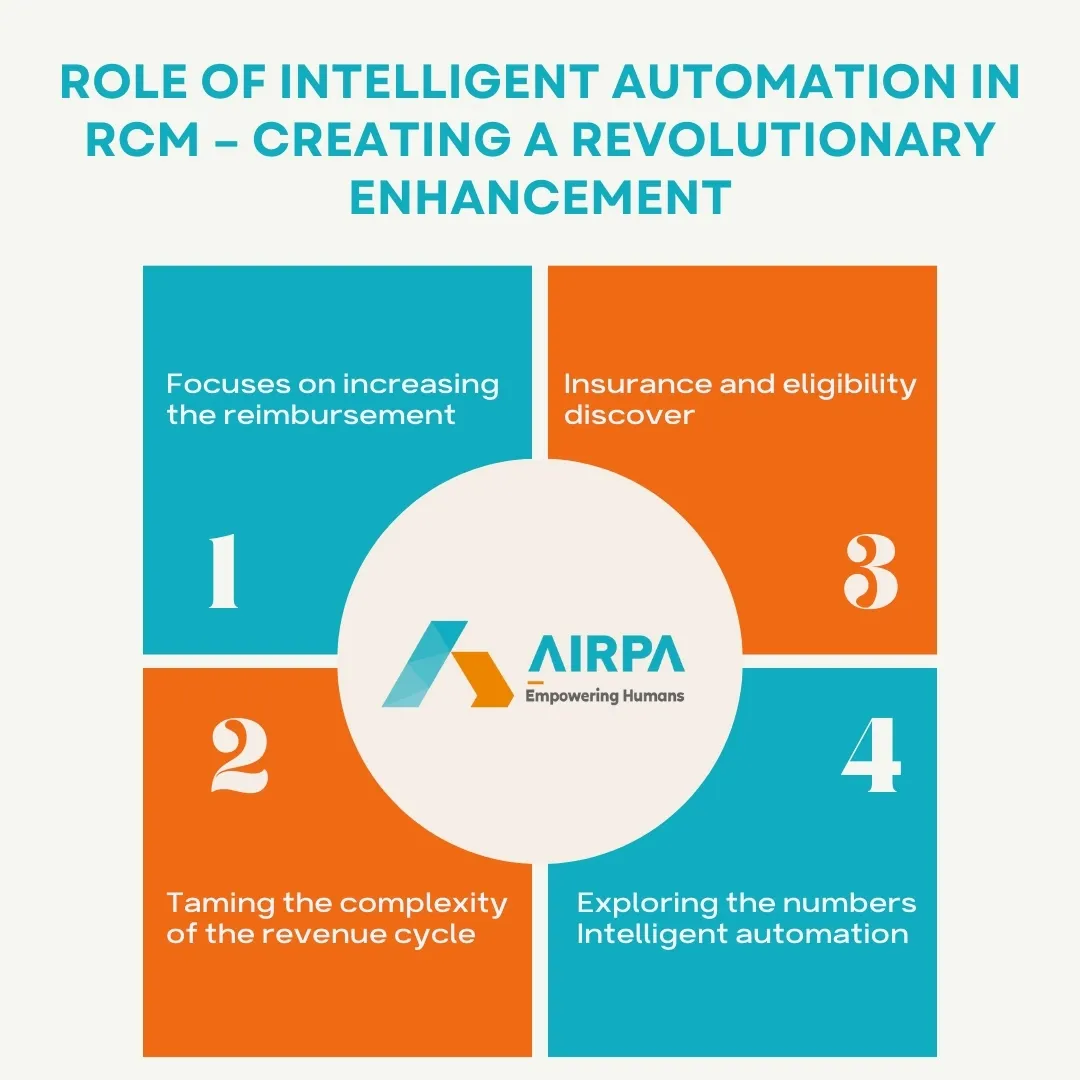
Role of Intelligent Automation in Revenue Cycle Management – Creating a Revolutionary Enhancement

Table of Contents
Intelligent Process Automation (IPA), Artificial Intelligence (AI), and Robotic Process Automation (RPA) have gained significant traction among Intelligent automation (IA) organizations due to their potential benefits. In the realm of revenue cycle management, intelligent automation technologies play a pivotal role in streamlining the entire process. These technologies empower medical organizations to enhance their overall operational efficiency and reduce collection costs, ultimately leading to improved cash flow. Increased cash flow translates to higher profit margins for hospitals, making these technologies invaluable assets for Intelligent automation (IA) organizations seeking financial sustainability and growth.
Talk to Our Automation Expert!
+91 855-975-9735
Want to experience Intelligent Automation in Action or Need help Building the Right Automation Plan?
What are the Ways Intelligent Automation Has Brought a Major Impact In Revenue Cycle Management?
The revenue cycle management services approach is compliant with the overall improvement process when utilizing robotic process automation because it focuses on statistics and workflow. For example, in terms of accounts receivable, robotic process automation plays an important role since it increases hospital efficiency and reduces the work required to collect payments from patients and payers.
Authorization and eligibility are among the upstream processes that are streamlined. When these techniques are merged into a unified platform with all of the advanced analytics, the impact of robotic process automation on the overall financial returns to medical providers of all sizes can be quite significant.
Note the impact created by the RCM automation:
1. Focuses on increasing the reimbursement
As commercial and government payers reduce reimbursement rates, and medical providers are obligated to comply with a complex array of evolving regulations, the need for robotic process automation to address these challenges has become substantial. There are few ways to overcome these challenges without adding complexity or cost. One proven approach to achieve maximum benefits is leveraging RPA to improve revenue cycle management services.
BOTs form a digital layer on existing financial management and EHR (Electronic Health Record) systems to automate time-consuming and repetitive tasks within the revenue cycle processes. These BOTs work seamlessly across the organization, in harmony with staff, resulting in higher efficiency and productivity.

2. Insurance and eligibility discovery
Insurance and eligibility discovery are crucial for creating clean claims with high potential for insurance payments and managing accounts receivable. Seeing eligibility in real-time within the work system speeds up revenue cycle management solutions. While many clearinghouses and systems offer this benefit when used with robotic process automation, the data and results enable an efficient and robust claims management process. The BOT-driven process provides accurate data with little manual intervention, reducing time spent on incomplete or rejected claims. Robotic process automation (RPA) bots can quickly search large insurance payer datasets for available benefits and coverages. This allows for better initial claim filing, reducing denials due to misinformation - particularly crucial when coverage information is not readily accessible.
3. Taming the complexity of the revenue cycle
Revenue cycle management in medical billing involves many intricacies and complexities that need to be properly addressed for hospitals to improve profit margins. These include incomplete or missing clinical documentation, financial clearance issues, patient collections challenges, incomplete patient statements, coding complications due to manual intervention, and more. Incomplete documentation can lead to claim denials or reimbursement problems. Errors anywhere in the medical billing procedure can disrupt the entire revenue cycle, hurting providers' financial health. To recover financial losses, eliminating errors and taming the intricate complexities of the revenue cycle is crucial. Intelligent automation (IA) solutions can assist with this.
4. Exploring the numbers - Intelligent automation
While robotic automation can transform the entire revenue cycle, a complete evaluation of existing workflows and processes is crucial to start. This requires expertise in revenue cycle management for medical billing. Although most revenue cycle processes rely on proper functioning of the revenue cycle, manual intervention is still required for optimization, despite the potential for complete automation.
In this context, RCM and AI ecosystem specialists undertake comprehensive evaluations and optimizations. Their end-to-end platform facilitates digitization of the revenue cycle, enhances performance margins, liberates staff resources, and delivers various other benefits.
Summing Up!
It is evident that information technology has revolutionized numerous aspects of Intelligent automation (IA), significantly improving the overall patient experience. Companies like AIRPA have been at the forefront, offering exceptional medical billing services to the healthcare industry, leveraging cutting-edge technologies to streamline processes and drive efficiency.
Want to know more….
Popular Tags:
Related Articles

How Automation and AI are Reshaping the Fintech Landscape
Is AI the driving force behind fintech's rapid evolution?





